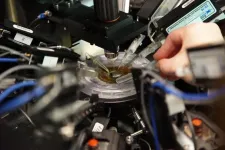(Press-News.org) URBANA, Ill. – Talking to their parents about daily stressors can help adolescents deal with their problems. This is particularly important during the transition to middle school, when youth often are faced with new peer and academic challenges. But does it matter where these conversations take place? That’s the topic of a new study from the University of Illinois Urbana-Champaign.
“We were interested in the environmental settings for mother-youth conversations. Where do they typically happen, and what are the preferred locations? We wanted to get the perspectives of both the youth and their mothers,” said co-author Kelly Tu, associate professor in the Department of Human Development and Family Studies (HDFS), part of the College of Agricultural, Consumer and Environmental Sciences (ACES) at Illinois.
The study included a racially diverse community sample of 100 fifth-grade students and their mothers. The pairs were first asked to discuss recent peer and academic problems the child had experienced, then they were interviewed separately about their preferred environments for talking about these issues. The researchers focused on mother-child dyads because mothers often are the primary caregiver who spends more time with youth and tend to be more involved with day-to-day activities.
Youth and mothers identified seven preferred locations for their conversations, including the house in general, youth’s bedroom, kitchen, living room, parent’s bedroom, car, and outdoor leisure spaces.
“The youth most frequently mentioned the house in general, followed by their bedroom, the kitchen, and the living room. They felt the home was a safe space and being in a comfortable environment encouraged conversation,” Tu said. “Their bedroom was the preferred location if they needed privacy, whereas if they wanted input from more family members, they preferred the kitchen or living room.”
For mothers, the top three locations included the kitchen, youth’s bedroom, and the car.
“Mothers often preferred to talk in the car because they could engage in side-to-side conversations with their child, which they felt made the conversation easier and less intimidating compared to directly looking at one another. In the interviews, they would say, ‘Where we talk about this the most is in the car, when I'm doing pickup or taking them somewhere because it gives us time and space away from others.’ However, the car was not a preferred setting for the kids — perhaps they felt like they didn’t have as much control in the conversation because it was a parent-dominated space,” Tu noted.
Boys in particular mentioned outdoor leisure spaces, such as playing ball in the backyard or walking the dog. Family size also mattered in the responses. Only children were more likely to prefer the living room, perhaps because they were less likely to need the privacy of their bedroom. On the other hand, children with multiple siblings may not have their own room, so the parents’ bedroom may be better for private conversations.
“We also found that families preferred to talk together in spaces that were already part of their established family routines because they provided opportunities for kids to initiate conversation,” said lead author Dina Izenstark, an associate professor at San José State University who conducted the research as a doctoral student in HDFS. Mealtime routines can provide opportunities for each family member to talk about their day, while bedtime routines provide a more intimate setting for one-on-one conversations that need more discretion.
“Moms were talking about how they had been doing these things for a long time; for example, asking children about their day when tucking their kid in at bedtime or while eating dinner together. These kids are still young, and it may change during their teenage years, but they have the foundation for these conversations to continue to take place,” Izenstark stated.
The research sample consisted of predominantly higher-income families, and results may not be directly generalizable to other groups, the researchers noted. For example, if a parent is working a third shift, the home is small, or there are multiple siblings, the time and space for privacy to talk about daily stressors may look different.
“We have to tailor our advice and rethink what it looks like for families in various circumstances. Every family is going to have their own pattern of moving through the day and their own rituals and routines, but we know that environmental setting matters and it is important for families to select a place to talk that is preferred by both the child and the parent as a way to more meaningfully connect with one another,” Izenstark said.
The paper, “An exploration of the environmental setting mothers and early adolescent youth prefer to have conversations about daily stressors,” is published in the Journal of Early Adolescence [DOI: 10.1177/02724316241240111]. Authors include Dina Izenstark, Kelly Tu, Janet Bang, and Natalee Maynard. This work was supported by the National Institute of Food and Agriculture; Hatch Project (ILLU-793–344).
END
When mothers and children talk about problems, environment matters
2024-06-04
ELSE PRESS RELEASES FROM THIS DATE:
How tumor stiffness alters immune cell behavior to escape destruction
2024-06-04
Immunotherapy is based on harnessing a person’s own immune system to attack cancer cells. However, patients with certain tumors do not respond to these therapies and it remains unclear why.
“The full impact of anti-cancer immunotherapy has not been realized, especially for some solid tumors,” says Kevin Tharp, Ph.D., assistant professor in the Cancer Metabolism and Microenvironment Program at Sanford Burnham Prebys.
Researchers presume that part of the reason why these therapies fail is due to tumor-associated fibrosis, the creation of a thick layer of fibrous collagen (like scar tissue) that acts as a barrier ...
Convergence and collaboration to achieve circularity
2024-06-04
The linear consumption model of raw material extraction, production, use, and disposal dominates the global economy, but it’s led to serious unintended global consequences: from resource use to pollution including negative impacts on environmental and human health that disproportionately affect the Global South.
In contrast, circular economy – a model where products and materials are by design kept in continual use – aims to decouple economic growth from resource consumption.
While approaches ...
Wayne State University partners with Great Lakes Water Authority to help train water pipeline managers of the future
2024-06-04
DETROIT — The Great Lakes Water Authority (GLWA) has partnered with Wayne State University to develop its Workforce Development and Pipe Management Program, which will help recruit, teach and graduate the next generation of water pipeline managers. The two-year program will begin July 1, 2024, and will be supported by a contract totaling more than $480,000.
The GLWA says that water utilities are experiencing significant employee recruitment, training and retention challenges. An additional concern is the availability of specialized technical training that addresses recent technological advances in the water sector. In response to these challenges, the Workforce Development and ...
NRG Oncology abstract considered “best of ASCO” for 2024 shows difference in outcomes for node-negative versus node-positive pancreatic cancer patients when adding chemoradiation to systemic therapy
2024-06-04
NRG Oncology recently reported the results from the radiotherapy randomization, which was the second step of their NRG-RTOG 0848 clinical study comparing adjuvant chemotherapy with or without chemoradiation for patients with resected periampullary pancreatic adenocarcinoma. The trial data did not show that the addition of radiation and chemotherapy to adjuvant systemic therapy improved overall survival (OS) for all patients on the study, however, OS was improved among node-negative patients. OS was essentially the same between treatment arms for node positive patients. The trial data also showed that disease-free survival (DFS) was improved with ...
Emma Guttman-Yassky, MD, Ph.D., receives high honor at European Academy of Allergy and Clinical Immunology
2024-06-04
Emma Guttman-Yassky, MD, PhD, Receives High Honor at European Academy of Allergy and Clinical Immunology
The Paul Ehrlich Award for Experimental Research recognizes scientists who have revolutionized the understanding of allergic diseases and immunological mechanisms.
New York, NY (June 4, 2024) – The 2024 European Academy of Allergy and Clinical Immunology (EAACI) Annual Congress selected Emma Guttman-Yassky, MD, PhD, Waldman Chair of the Kimberly and Eric J. Waldman Department of Dermatology, and Professor of Dermatology and Immunology, Icahn School of Medicine at Mount Sinai, as the recipient of the ...
An anti-inflammatory curbs spread of fungi causing serious blood infections
2024-06-04
A team of UC Davis Health researchers discovered that a common anti-inflammatory drug, mesalamine, can replace the work of good bacteria in fighting the nasty fungus Candida albicans in the gut.
C. albicans, or candida, is known to cause yeast infections. In some cases, it develops into invasive candidiasis, a potentially fatal infection occurring mostly in patients with compromised immunity.
The researchers found that this fungus can’t grow without an oxygen supply. Their study in mice showed that the drug can ...
Intracerebral hemorrhage stroke outcomes improve with early minimally invasive surgery evaluated in clinical trial
2024-06-04
INDIANAPOLIS – Patients with an intracerebral hemorrhage have better medical outcomes when surgeons perform an early minimally invasive removal of a hematoma compared to those receiving the standard of care, according to a study published in the New England Journal of Medicine.
Indiana University School of Medicine faculty clinicians Mitesh Shah, MD, Bradley Bohnstedt, MD, Regg Singh, MD and Jason Allen, MD, PhD are co-authors ...
UC San Diego Health first in region to provide novel therapy for melanoma
2024-06-04
UC San Diego Health is the first hospital system in the region to offer a new immunotherapy treatment for metastatic melanoma. The personalized cellular therapy derived from tumor infiltrating lymphocytes (TIL), is the first solid tumor therapy on the market approved by the U.S. Food and Drug Administration (FDA).
“This one-time cellular immunotherapy is a powerful and robust tool to treat patients with advanced melanoma resistant to other approved therapies and who have limited treatment options,” said Gregory Daniels, MD, PhD, professor of ...
Zapping the right brain cells: The path to improved stimulation
2024-06-04
By Jake Siegel
SEATTLE, WASH.—June 4, 2024—New research by scientists at the Allen Institute’s Brain and Consciousness group and Cedars-Sinai offers an unprecedented look at how neurons respond to ES. Far from being uniform, different types of neurons showed distinct patterns of ‘syncing up’ with electrical fields. These patterns varied depending on the rate at which the ES was delivered.
The findings, published today in Neuron, could help doctors fine tune where, when, and how ...
How an Indian government policy backfired: the unintended consequences of price regulation of prescription drugs
2024-06-04
Researchers from Indian Institute of Management Calcutta, University of Chicago, and Management Development Institute, Gurgaon published a new Journal of Marketing study that examines the unintended consequences of an Indian government healthcare policy.
The study, forthcoming in the Journal of Marketing, is titled “Do No Harm? Unintended Consequences of Pharmaceutical Price Regulation in India” and is authored by Saravana Jaikumar, Pradeep K. Chintagunta, and Arvind Sahay.
In countries without universal health insurance or developed health care systems, governments try to make drugs affordable and accessible. For instance, ...


